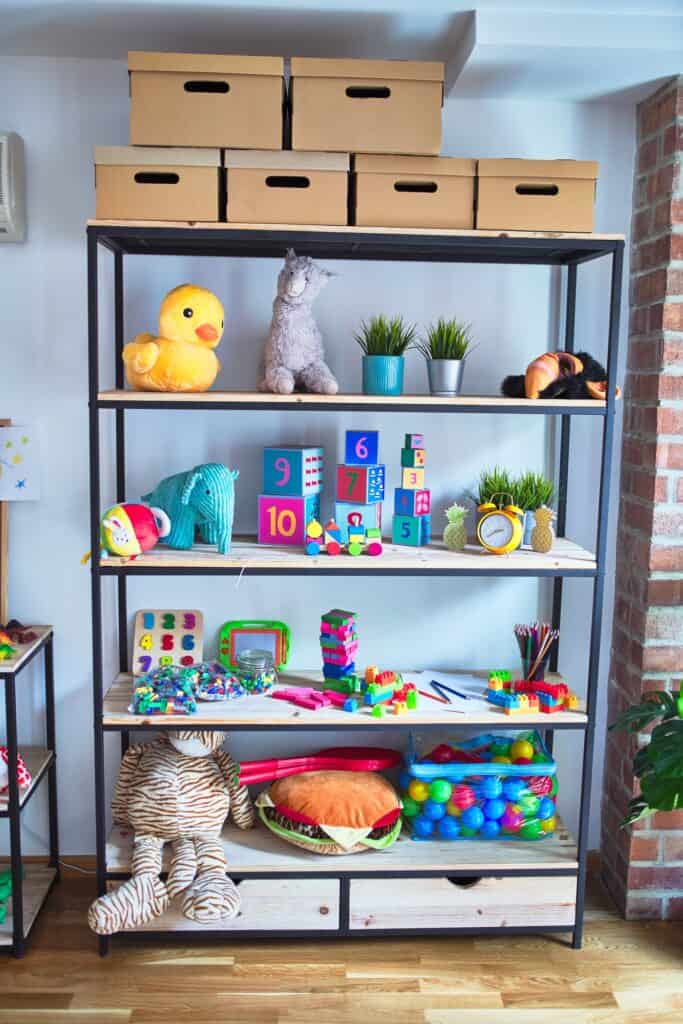Inside: Tired of always feeling tired, stretched too thin, and stressed out as you try to manage your home? These 7 powerhouse home management tips will help you create a custom home management system that eliminates stress and leaves you with a cleaner, more organized home!
Managing a home is a full-time job all by itself. Between cleaning, organizing, cooking, paying bills, running errands, and completing small repairs, all the tasks that are necessary for home management can easily consume the entire day.
And if you don’t have any systems in place, you’re probably overwhelmed with all of it. I would know because that’s exactly how I felt. Managing our house and raising our kids was much more difficult than my corporate job because I didn’t have the tools I needed to get the job done.

Why You Should Use a Home Management System
In my corporate life, I know how to help teams of people prepare for their future. But, when I started to focus on raising our family, I didn’t know how to manage my own house. I was frustrated, stressed, and overwhelmed, to say the least.
That’s because I didn’t have a home management system. I simply didn’t have a way to make sure that I was staying on track, instead of dropping all the balls.
7 Top Home Management Tips That Are Actually Easy and Effective
While my home management skills were less than ideal at first, I was determined to come up with systems to make it extremely manageable. After years of fine-tuning those systems, I am now sharing my top tips with you to help you hone yours!
1. Use To-Do Lists
One of the things I discovered early on when I began managing our home was I couldn’t make it work without to-do lists. There are just so many things that come up and need to be addressed but also get forgotten in the busyness of life.
Life happens. The washing machine needs to be repaired. The grass gets long and full of weeds. The heat won’t turn on. Your son needs his baseball uniform washed pronto.
When it comes to managing a household, let’s face it: the to-do list is extensive. That’s why it helps to get all the tasks out of your brain and on paper so that they aren’t using up precious memory space or energy just to remember them.
Make your to-do list a part of a home management binder so it’s always ready when you need it.
2. Cleaning Routine Checklist
Certain cleaning tasks must be done daily, while others need to be done regularly but less frequently (weekly, monthly, etc). Staying on top of these tasks is the difference between feeling overwhelmed and feeling like you’ve got everything under control. Make a list of chores and split them into what needs to be done daily, weekly, or monthly.
Daily Chores
Here are a few examples of chores that need to be done daily in order to help you stay on top of them:
- Make beds
- Wiping down the kitchen after use
- Sorting through the mail or papers from school that come home
- A load of laundry
- Put shoes and clothes away each day
- Sweep the floors
- Wash dishes
This was just a list of examples. If you have other daily chores, add them to the list!
Check out my 10 Minute Speed Cleaning Tasks to help you tackle those daily chores quickly so your house always feels clean.
Weekly Chores
This list might include things like:
- Vacuuming
- Mopping
- Dusting
- Cleaning the bathrooms
- Changing bedsheets
Again, feel free to modify this list based on how often you want certain chores done.
Monthly Chores
Some ideas of monthly chores (or tasks) might include:
- Do a monthly clean cycle for your washing machine
- Run a monthly clean cycle for your dishwasher
- Change your furnace filter
- Clean bedrooms
- Dust blinds and ceiling fans
In other words, if you want to keep your home clean without spending all weekend long cleaning it, do a little at a time – consistently. The effort goes a long way and reduces those feelings of overwhelm that engulf you when you look around at a filthy house.

3. Calendar
Do you remember when your next dentist appointment is scheduled? How about when the A/C repair guy is coming? Your daughter’s orthodontist appointment? Or your husband’s work party?
Life flows at a breakneck speed these days, which means that you are often hearing about (or scheduling) events that your brain doesn’t retain as it’s also trying to remember 9,738 other things.
Keep a calendar handy. Whether you use a trusty paper version or a calendar on your smartphone, having an updated calendar always at your fingertips is huge for helping you keep track of all. the. things.
Tip: If you use a calendar in your smartphone, take advantage of the feature that allows you to set alerts. I always set alerts for my events. In fact, I sometimes set multiple alerts if I think I might forget about an event so that I am not too distracted and forget where I need to be!
4. Meal Plan & Prep
Meal planning is one of the easiest and most impactful home management tasks you can do. Really, it’s your secret weapon.
It literally shaves hours of work off your week and eliminates the daily frantic struggle to come up with a dinner plan (and get it made in time while also running soccer carpool and helping your daughter with her homework).
Here are some other benefits to meal planning:
- It limits the number of trips (and time spent) going to the grocery store.
- It saves money by eliminating aimless grocery shopping.
- It’s healthier (and cheaper) for your family because you spend less on unplanned take out or drive through meals.
Learn how to do easy weekly meal planning and save yourself the headaches and stress of figuring out what’s for dinner each night. If not, I highly recommend you check out some of these menu planning services if that fits better into your schedule and lifestyle.
The next time you hear the question that used to spark dread in your heart, you can answer what’s for dinner without any hesitation (or scrambling)!
5. Get Finances in Order
Part of managing a home is keeping track of finances and paying the bills. Having a clear picture of the money that comes into the household and where it flows is crucial for a smooth-running home.
Get your finances in order by setting a budget and sticking to it. You can find everything you need to get started by setting a budget and paying bills on time in my Home Management Binder.
6. Develop A System For Organization
If being organized doesn’t come naturally to you, that’s ok. There are certain things you can do to make your home more organized in a way that fits your personality.
If you take a look at organizational systems that professional home organizers use, you can adapt them to your own home so that they work for you.
Here are a couple of gems to help you get started:
- Designate a “home” for everything. When everything has a place where it belongs and is in that spot, there is no clutter. “A place for everything and everything in its place” as the saying goes.
- Use baskets, bins, and other storage containers to create organized (and designated) places for everything. Label them to keep them organized.

7. Create Routines
People naturally crave routines, so build routines that fit your personality and help you stay on track. When you have a backbone for your day, it’s easier to stay on task and be productive than when you’re moving aimlessly from task to task.
Use your daily tasks, your frequent appointments, and other commitments to establish a daily routine that helps you.
Home Management: Final Thoughts
Adopting these 7 home management tips will help you implement a home management system that helps you stay organized and stress-free.
Need a little extra help? My Home Management Binder will help provide the structure you need. No more missed appointments or dinnertime frustrations!








